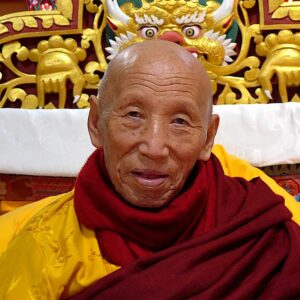It is important to recognize that extended practice can proliferate and aggravate rlüng (lōōng). As we remember from our introductory blog post, rlüng are the coarse and subtle winds in the body upon which mind rides and psychophysiological movement occurs in the body. When extending your meditation practice hours, make sure to keep your rlüng balanced with nourishing foods, surroundings, and routines. Aggravated rlüng can exacerbate underlying physical and emotional conditions. During Tibetan medical school, due to long hours of recitation (5-6 hours per day), many of us developed rlüng imbalances, and there were a couple of students who had to leave the school for 6 months to a year to recover from psychic breaks, persistent headaches, skin irritations, boils, dizzy spells, upper stomach pain, and other cascades of symptoms.
Care-taking rlüng is important for supporting your practice. Across our Samye community, our team of doctors has had sangha members ask about the various effects they’ve experienced from extended hours of practice and its impact on the subtle channels. For example, frequent headaches and migraines, a steady increase in the flow of thoughts, a sense of restlessness, impulsivity and intensity, dizziness, shakiness, and so forth—despite, for some, over ten years of daily meditation practice.
Be Attentive to Aggravating Conditions
Rlüng proliferation and aggravation can occur any time we have excess mental or verbal activity; exposure to harsh, cold, windy environments; experience inordinate periods of stress and distress; sustain long periods without proper nutrition, or constant on-the-go running while eating poor quality un-nutritious food; experience blood loss; encounter times of minimal sleep or poor quality sleep; force or block normal bodily processes, and so forth. During these times of rlüng aggravation, it is important to make sure you are getting solid nutritious meals frequently throughout your day and not going for long periods without eating.
Nutrition Advice
Eating frequently, and eating nutritious and rich, dense foods helps ground rlüng. Tsampa and organic grass-fed dri (female yak) butter are excellent in Tibet for grounding rlüng. In the West, warm mixed grains of spelt, amaranth, oat groats, and barley would be excellent with a touch of organic grass-fed cow butter or flaxseed oil. Bone broth soups with garlic and onion, caraway, cumin, ginger, and cilantro provide qualities to rebalance rlüng. In the West, making sure one has good solid proteins at each meal, can be a helpful approach.
Cold water fish helps warm the digestive fire and ground rlüng. Consuming red meat can be particularly important for rebalancing rlüng as well, but chicken, mutton, tofu, and kidney beans can be helpful too. It is important to minimize caffeinated beverages generally or at least have a milk/cream addition and/or raw honey in your coffee/black tea/green tea to counter the rlüng aggravating effects. Integrating clean oils is important for re-balancing rlüng. A dash of ghee is fantastic to add to meals. Warm organic nut or cow’s milk at night with 1/2-1 tsp fresh ground nutmeg helps balance the heart rlüng.
Self-care and Friends
Rlüng also responds well to warmth, dim candle lighting (like being next to a fire), fragrant wood incense/scents, pleasant music, and warm oil massage. You can do a self-massage using warm unrefined cold-pressed sesame oil with nutmeg and caraway mixed in. It is important to integrate time with close friends or dear ones to rebalance rlüng—long periods of solitude can continue to proliferate the rlüng, particular if mental activity is high.










Responses
Thank you so much for this article, Tawni. Just reading it has me feel a little more balanced–just imagine when I put it into practice. I am going to share this with a friend who is a nutritional coach and chef. Are there any types of exercise that are useful as well in balancing rlüng?
Warmly, Kelly
Thank you for your response, Kelly. Great to hear that the article has been helpful for you and might interest your nutritional coach and chef friend. There are various exercises that will help support rebalancing rlüng. Those that are warming and focus attention on proper flow in rlüng pathways are ideal. Trul-khor practices are particularly helpful. Other yoga practices that focus on breath, generate internal heat, and work with rlüng pathways are also supportive. Exercise with friends or those with whom one has good relation can be useful in balancing rlüng. Exercise that has minimal talking or verbal activity would also be helpful since overuse of speech and verbal activity increases rlüng. Doing these exercises/activities in dim, warm lighting, such as near a wood fire, would also be nourishing for rlüng. I hope that helps give some ideas. Thank you for your question. Many warm wishes, Tawni